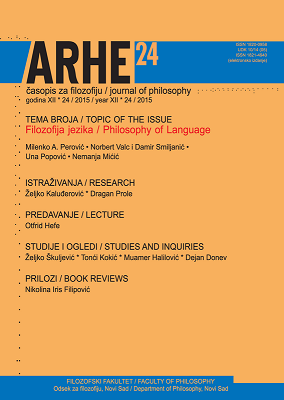Analiza zastupljenosti filozofskih predmeta i tema u „izveštajima” Novosadske gimnazije. Period od 1918-1941. godine
Analysis of Representation of Philosophy Subjects and Topics in the “Reports” of Novi Sad Grammar School in the Period 1918-1941
Author(s): Željko KaluđerovićSubject(s): Philosophy, School education, History of Education, Interwar Period (1920 - 1939), Sociology of Education
Published by: Филозофски факултет, Универзитет у Новом Саду
Keywords: Novi Sad Grammar School; “Reports”; analysis; representation; philosophy subjects; philosophy topics;
Summary/Abstract: The author’s research of the representation of philosophy subjects and topics in the “Reports” of Novi Sad Grammar School starts from the “Report” for the school year 1918/19 and ends with the “Guidelines to pupils of The State Male Practical High School of King Aleksandar I in Novi Sad for the academic year 1940-41”. The author concluded that this 23-year long period can be divided into two mutually temporally disjointed segments. The fi rst period consists of two segments (the first one, from the academic year 1918/19 until 1924/25, and the second, from the academic year 1930/31 until 1932/33). During these academic years, Philosophy and/or Philosophical Propaedeutics (Logics and Psychology) was mostly present in the class teaching of the Grammar School (taught in the final two grades (VII and VIII), with 4 teaching hours per week). The second time period is also segmented (from the academic year 1925/26 until 1929/30, and from the academic year 1933/34 to 1940/41). The status of Philosophy and/or Philosophical Propaedeutics (Logics and Psychology i.e. Basics of Psychology) in this period was more unenviable than in the previous period, with a load of only 2 teaching hours per week in the VIII grade of Grammar School. Philosophical topics and literature were represented in the Grammar School also through curricula of classical languages. The Latin language course included the study and translation of manuscripts of the great orator and Roman eclectic Cicero (De imp. Gn. Pomp., In Catilinam Oratio, Pro Archia poeta oratio, De senectute, Laelius de amicitia, De amic.), works of the famous later Roman Stoic Seneca (De divitibus), as well as translated unnamed Socrates’ sayings. As for the teachings of the Greek language, the works of Homer (Iliad, Odyssey), Herodotus (History), Xenophon (Memorabilia, Cyropaedia), Sophocles (Antigone) and the parts of Plato’s Apology were read and interpreted. For more than two decades of Novi Sad Grammar School work that is studied, many important events had occurred, however the organization and execution of the class teaching of the only philosophical subject did not automatically and consistently follow all of these changes. Moreover, the teaching of Philosophy and/or Philosophical Propaedeutics in Novi Sad Grammar School had a particular rhythm of evolution, and its design, beyond all the qualitative and quantitative changes, did not match at all, or in other words rarely coincided with predicted and applied solutions and decisions.
Journal: Arhe
- Issue Year: 2015
- Issue No: 24
- Page Range: 87-104
- Page Count: 18
- Language: Serbian

